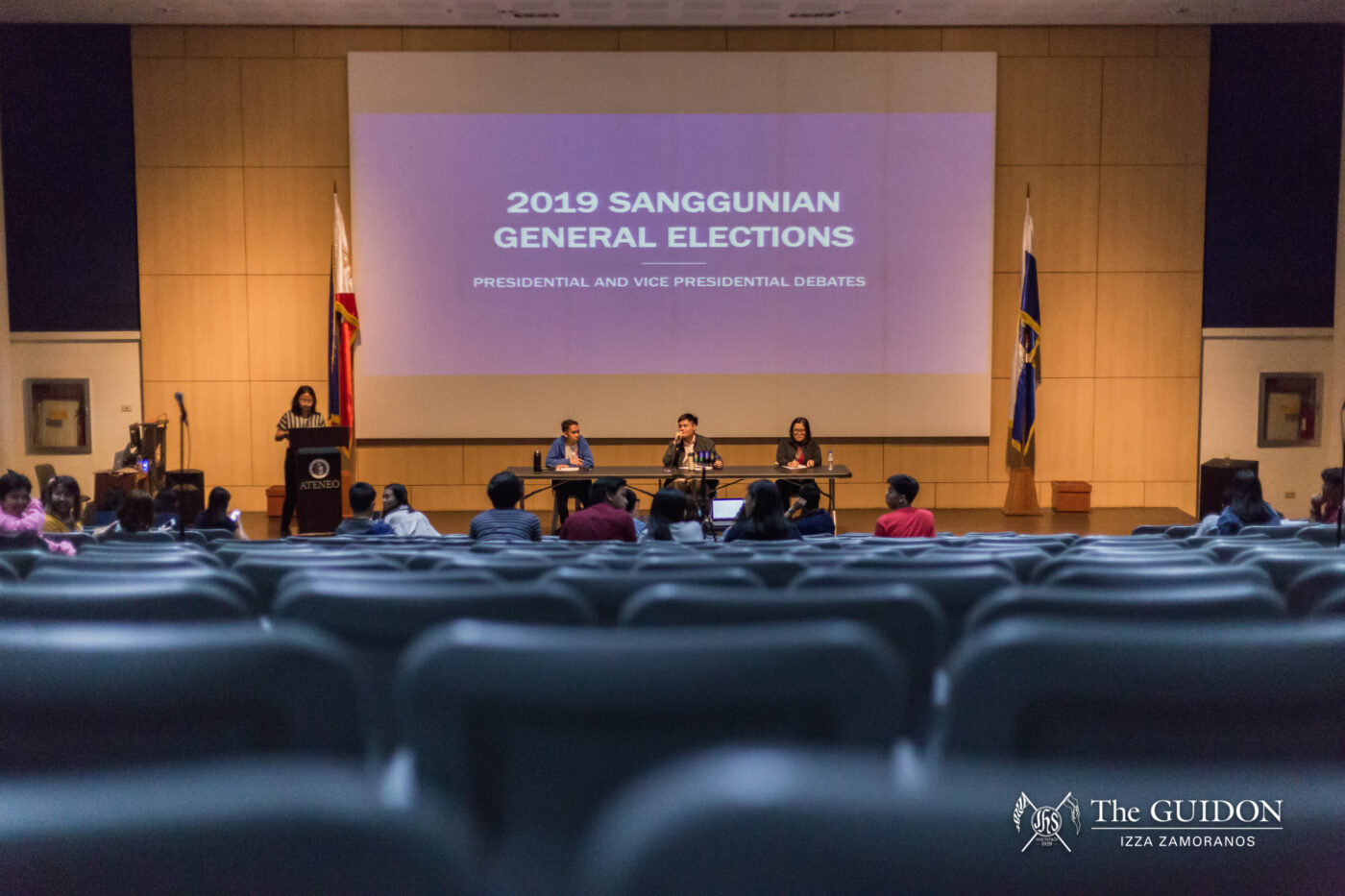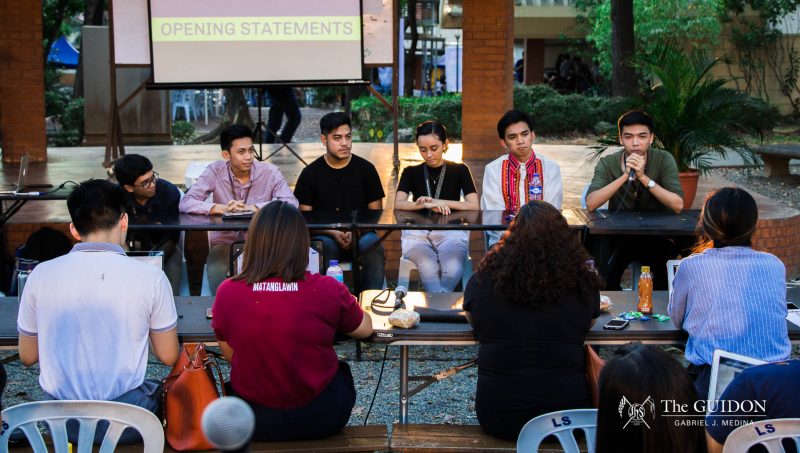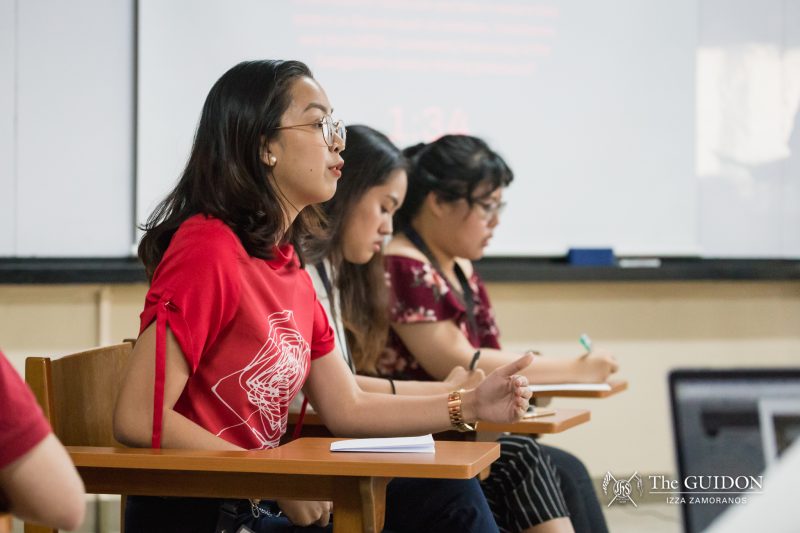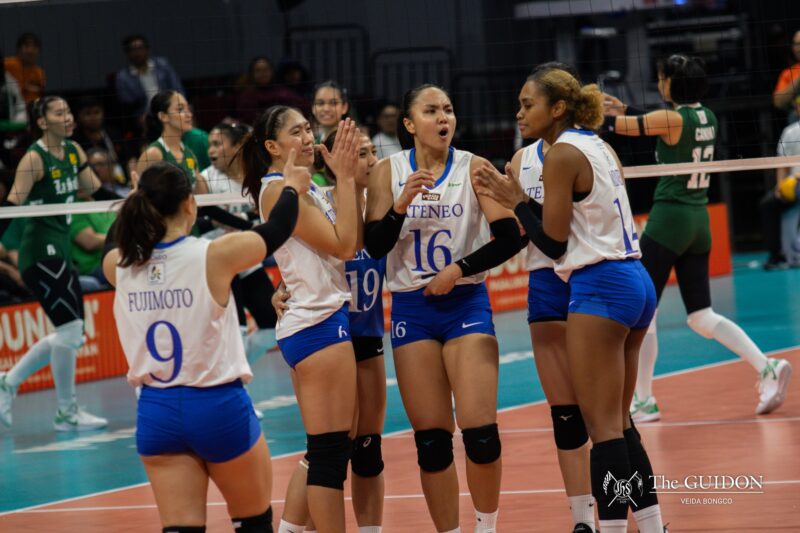A NUMBER of heated exchanges on the candidates’ platforms and political stances took place in the 2019 Sanggunian General Elections’ Presidential and Vice Presidential (PVP) debates. Candidates tackled the Sanggunian’s internal management, external engagement, and participation in national issues at the Leong Hall Auditorium last Thursday, March 7.
Candidates included Union of Students for the Advancement of Democracy (USAD) standard-bearer Samantha Que for president and running mate Jego Yap for vice president, and independent vice presidential bet Brian Gan.
The GUIDON’s Editor-in-Chief Michelle Abad and Associate Editor Franco Luna, along with Matanglawin Ateneo’s Punong Patnugot Jessica Gayo served as the PVP debates’ panelists.
The event was the first of the two-part 2019 Sanggunian General Elections debates series, with the school representative debates held the following day, Friday, March 8.
Sanggunian for the students
The debates opened with a discussion on how the Sanggunian can safeguard the students’ mental health, to which the candidates offered their suggestions as to how they can better address these concerns.
Yap stated that a mental health policy in partnership with the Loyola Schools Office of Guidance and Counseling (LSOGC) is important. During the open forum, panelist Gayo raised the concern of the students’ supposed distrust of the LSOGC. In response, Que explained that the creation of the Sanggunian’s Commission on Mental Health is an alternative platform to directly involve the LSOGC in assisting the students with mental health issues.
While on the topic of accommodating students’ concerns, doubts surrounding the efficacy of the Sabihin sa Sanggu (SSS) initiative were brought up. According to Gan, SSS aims to increase efficiency in the collection of students’ concerns between the Sanggunian and its constituents. Gan added that the primary function of the Sanggunian is to be a voice of the students to the University administration, but stressed that it should be more “proactive” in a sense that it does not just “wait for students to go [to the Sanggunian].”
He proposed the creation of a “department that better [reaches] the different sectors” of the Loyola Schools community by collaborating with organizations, asserting that a majority of the student populace belongs in one.
Panelist Abad then also asked about how the Sanggunian can better protect sexual harassment victims, considering that some perpetrators of such cases still continue to teach even after cases have been brought to light through unofficial channels like ADMU Freedom Wall.
Que said that the proposed revisions for Magna Carta of Undergraduate Students’ Rights focused on providing more inclusion for different sectors in the community, particularly for women. She added that the proposed Magna Carta revisions include provisions on what constitutes as sexual harassment, which can help victims forward their case to the University administration. In addition, Que stated that she believes the Magna Carta should be revisited by the Sanggunian every school year, given that the University environment “always changes.”
Yap also encouraged victims of sexual harassment to approach the Sanggunian for assistance. “Proper guidance will be given if the victim approaches Sanggu,” he said.
Aside from mental health and sexual harassment concerns, complications faced by transferee students were also brought up. To address these, Que said that she hopes to provide extra assistance through different dialogues and frameworks in order for transferees to “transition better” to Ateneo. As for Yap, he said he plans to strengthen the Sanggunian’s relations with the Office of the Associate Dean for Academic Affairs (ADAA) by delegating one person per school to address transferee block concerns. Gan, on the other hand, admitted that he was not aware of the nuances of transferee struggles.
On balance and accountability
A recurring concern raised during the debates was the Sanggunian’s uneven distribution of work—which often led to burnout among its members. Candidates were then asked about their plans to ensure balanced assignments of projects among the different departments of the Sanggunian.
Yap proposed to distribute workload according to the Sanggunian members’ schedules so that officers can allot adequate time to better focus on their duties. Meanwhile, Gan stressed the importance of proper discernment in assigning which departments should tackle internal and external duties.
“We have to make sure that members of the Sanggu don’t get burnt out kasi ang nangyayari is nawawala sila. Inaalagaan din namin ang mental health ng members sa loob ng Sanggu,” Yap said.
(We also have to make sure that members of the Sanggu don’t get burnt out because what happens is they stop appearing [to work]. We also have to take care of the Sanggu members’ mental health.)
Additionally, controversies regarding the “toxic culture” of “resume-padding” within the Sanggunian were broached after an audience member asked the candidates about how they can prevent this issue. Gan responded to this by saying that if the Central Assembly (CA)—composed of the president, vice president, and school representatives—does not fulfill their role, he would like to make use of the Sanggunian’s internal arms to certify accountability and ensure that officers deliver their legislative duties “through checks and balances.”
“[The internal arms] have the responsibility to hold the CA accountable if they’re not doing their legislative agendas properly. If people want to resume-pad, they at least need to do the work required for it,” Gan said.
After hearing of Gan’s plans for strengthening the Sanggunian’s internal arms, Yap responded by stating that those proposals are initiatives under his platform.
“You just affirmed what I said. That’s already present in my platform, and my platform goes deeper. Why not just drop your vice presidential bid and go for a position under my cabinet?” Yap remarked.
In response, Gan admitted that he had rushed the filing of his candidacy for vice president. Yap countered by saying that as a vice presidential candidate, one should properly discern, especially since the role requires a dedication to serve the student body.
A call for student engagement
Regarding the supposed lack of student engagement with the Sanggunian, Abad brought up the possibility of this being due to the students’ involvement in Ateneo’s “thriving org culture.” Following this, she then asked what the Sanggunian can provide the student body that student organizations cannot.
“Home orgs don’t always cater to all students of that course, [so] it doesn’t really encapsulate what we really need [as a course]. [The Sanggunian] can [conduct] academic reviews on different courses so that we’ll know what we can change and forward to the admin,” Que said.
As for Yap, the answer to the lack of engagement lies in empowerment. He noted that “true power” lies in the course representatives’ ability to legislate.
“The reps don’t know they have to power to legislate, and we want them to feel empowered,” Yap said. “[We want them to focus on] not just the needs of the constituents, but [also on forwarding] their own advocacies.”
Halfway through the debate, an audience member asked about the PVP candidates’ opinions on the lack of candidates from opposing parties. With both Que, Yap, and all school representative candidates running under USAD, Gan is the only independent candidate. Yap explained that he saw this as a threat because it meant that “no one is willing to engage in campus politics anymore.” The presence of the opposition, he said, is welcomed as “this creates deeper discourse [among] the candidates.”
On Twitter, however, Kevin Choa pointed out the lack of course representative candidates this year and the low voter turnout of less than 20 percent for the past two years. He then questioned whether the Sanggunian has truly empowered the student body to run for office.
Gan said he believed this to be a logistical concern and stated that “[the filing for candidacy] was skewed because [the registrar] only announced the course [representatives] that could be filed in the middle of candidacy.”
Additionally, an audience member pointed out that although the candidates sang the “same song every candidate sings,” pertaining to Que’s statement about “educating and empowering students,” there still remains a lack of concrete measures on how the candidates plan to achieve this student empowerment.
To this, Que stressed the importance of trust between the student body and the Sanggunian. According to her, this trust should encourage students to run for positions and vote. She also added that increased publicity of the special elections can better engage the students.
Asked how he plans to mobilize the student body, Gan claimed that the vice presidential position “isn’t concerned with that” as externalization and politicization fall under the president’s obligation.
Yap argued that the vice president is constitutionally obliged to aid the president. However, this claim was later proven false by an audience member, who called Yap “unfair” for implying that contender Gan is “incompetent.”
Gan countered that internal problems need to be assessed first, should he aid the president in carrying out external duties: “How can we mobilize if Sanggu keeps burning out every year?”
Serving beyond Ateneo
In the third round of the debates, the candidates were asked to provide their stances on national issues, which included the lowering of minimum age of the criminal responsibility (MACR), capital punishment, and environmental awareness.
Que stated that she is against the lowering of the MACR. She added that lowering the age from would mean “na puwede nating isama yung mga bata sa matatandang kriminal (that we could put children with older criminals),” which would lead to “a bad turnout” for them. Que then proposed that rehabilitation programs would be a better plan for juvenile criminals.
The GUIDON Features Editor Jayvee del Rosario pointed out that rehabilitation is already a part of House Bill 8858. With that, he asked Que to clarify her reasons for disapproving of the bill.
“The [rehabilitation] aspect is the only good part [of the bill], but everything else I’m against,” Que said.
Following this, a question was raised to Yap regarding his stance on capital punishment even in the cases of heinous crimes. In response, Yap said that it could not be justified.
“May cases na hindi sila nakasala, but they are still found guilty. If you approve capital punishment and find out this, hindi mo maibabawi yung buhay ng tao,” Yap said.
(There are cases where they didn’t do anything wrong, but they are still found guilty. If you approve capital punishment and find out this, you can’t bring back the life of a person.)
Yap also expressed his concern about the slow pace of the country’s judiciary system and how it impedes in the delivery of justice to the innocent. He proposed “speeding [up] the cases in the judiciary,” instead of focusing on using capital punishment to deter crimes as it is never “justifiable.”
Following this, heated exchanges between Gan and audience members again took place when the question of how the Sanggunian can promote a more environmentally-aware Philippines was introduced.
Gan said that as businesses are the “biggest players” in the issue, they need to have an incentive in order to embrace environmental sustainability.
“[What] governments should do is let businesses know that they can profit more if they are conserving the environment,” he said. Gan also added that for Sanggunian efforts, they should focus on projects such as increasing the number of trash cans around campus and promoting proper waste segregation.
A student from the John Gokongwei School of Management then responded to Gan by saying that his views downplay the “focus on sustainability,” as it makes the efforts to conserve the environment center on profit instead. Panelist Gayo also pointed out that recent projects handled by companies such as cleanups have displaced locals in the process.
Gan responded to this by saying that “a more inclusive approach” should have taken the place of displacement, one that focused on correcting the government’s poor management practices instead.
“Corporations can live forever, but men not so,” said Gan. “[What we need is] not a physical cleanup, but an attitude solution.”
Discourse on the subject of lobbying for Lakbayan sessions to push through in the Ateneo was met with controversies. Asked what their take on it is, Gan misconstrued Lakbayan to be an ideology or political opposition to USAD, but was later given clarification that Lakbayan serves as a sectoral program aimed to allow indigenous peoples to share their struggles and stories in different universities. On the other hand, while Que agreed with the purpose of Lakbayan, she stated she felt the need to “take into consideration the safety of the students first and foremost here in the university.”
Panelist Gayo then expressed that incumbent Sanggunian president Hyacenth Bendaña had a similar answer in last year’s PVP debate. Que explained that this year’s Lakbayan did not push through because of “miscommunications,” while Yap specified the cause to a lack of manpower and time constraint.
Former School of Sciences Representative Dasha Uy has since informed The GUIDON that Lakbayan did not push through during the term of former Sanggunian President Ia Marañon due to external organizers failing to submit the activity proposal and other needed documents.
Bridging the gaps
During the open forum, a concern was raised about how the Sanggunian does not seem to represent the opinions of the student body. In response to this, Gan said that he wishes for these students who feel left out to participate more in the Sanggunian.
Regarding supposed student apathy, an audience member asked about how the Sanggunian can increase student activities when it comes to national issues. To this, Yap said that he intended to seek partnerships with student-organizations to increase students’ political awareness.
Yap also pointed out that student apathy may be caused by the fact that “[students] don’t connect with a certain issue,” hence the lack of engagement. He states that current approaches of the Sanggunian such as the SSS need to be re-evaluated, as opening channels of communication may not be enough.
“It boils down to the students aligning themselves to the issue. Through forums, talks, and other initiatives, they may be able to find their advocacy,” he added.
Photo by Izza Zamoranos






